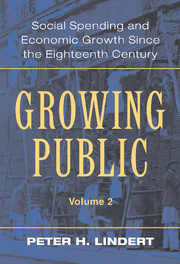Book contents
- Frontmatter
- Contents
- Preface to Volume 2
- PART FIVE THE UNDERLYING FRAMEWORK
- PART SIX ACCOUNTING FOR SOCIAL SPENDING, JOBS, AND GROWTH
- 15 Explaining the Rise of Mass Public Schooling
- 16 Explaining the Rise of Social Transfers, 1880–1930
- 17 What Drove Postwar Social Spending?
- 18 Social Transfers Hardly Affected Growth
- 19 Reconciling Unemployment and Growth in the OECD
- APPENDICES
- Notes
- Bibliography
- Index
18 - Social Transfers Hardly Affected Growth
Published online by Cambridge University Press: 12 January 2010
- Frontmatter
- Contents
- Preface to Volume 2
- PART FIVE THE UNDERLYING FRAMEWORK
- PART SIX ACCOUNTING FOR SOCIAL SPENDING, JOBS, AND GROWTH
- 15 Explaining the Rise of Mass Public Schooling
- 16 Explaining the Rise of Social Transfers, 1880–1930
- 17 What Drove Postwar Social Spending?
- 18 Social Transfers Hardly Affected Growth
- 19 Reconciling Unemployment and Growth in the OECD
- APPENDICES
- Notes
- Bibliography
- Index
Summary
In his presidential address to the American Economic Association, Nobel Laureate Robert Lucas offered two findings about the huge costs of taxation and, by implication, of the social transfers that are the excuse for most taxes:
“[S]tudies found that reducing capital income taxation from its current U.S. level to zero (using other taxes to [replace it]) would … imply an increase of consumption along a balanced growth path of 7.5 to 15 percent.”
“Edward C. Prescott … shows that … [t]he steady-state welfare gain to French households of adopting American tax rates would be the equivalent of a consumption increase of about 20 percent … with no increase in work effort! … in the neoclassical growth model.”
Such findings have two distinctive features. First, they show big numbers. Second they are not really findings. Contrary to the words offered so traditionally and casually by economists, none of these authors actually “found” or “showed” their results. Rather, they chose to imagine the results they announced. In every study Lucas cited here the crucial ingredient was a theoretical model laden with assumptions. It is educated, intelligent, plausible fiction – but fiction nonetheless, just like the blackboard diagrams, parables, and simulations we questioned in Chapter 10.
Theory and fiction cannot be dismissed out of hand, of course. Every theoretical model, like every good novel, is inspired by observation of the real world.
- Type
- Chapter
- Information
- Growing PublicSocial Spending and Economic Growth since the Eighteenth Century, pp. 82 - 99Publisher: Cambridge University PressPrint publication year: 2004



